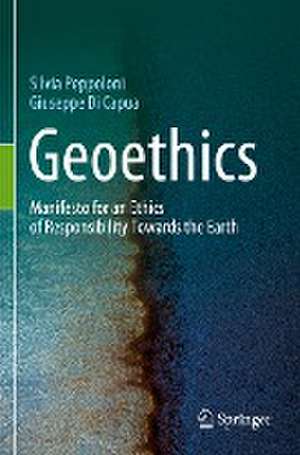Geoethics: Manifesto for an Ethics of Responsibility Towards the Earth
Autor Silvia Peppoloni, Giuseppe Di Capuaen Limba Engleză Paperback – 15 apr 2023
Geoethics identifies and orients responsible behaviors and actions in the management of natural processes, redefining the human interaction with the Earth system based on a critical, scientifically grounded, and pragmatic approach. Solid scientific knowledge and a philosophical reference framework are crucial to face the current ecological disruption. The scientific perspective must be structured to help different human contexts while respecting social and cultural diversity. It is impossible to respond to global problems with disconnected local actions, which cannot be proposed as standard and effective operational models. Geoethics tries to overcome this fragmentation, presenting Earth sciences as the foundation of responsible human action towardthe planet. Geoethics is conceived as a rational and multidisciplinary language that can bind and concretely support the international community, engaged in resolving global environmental imbalances and complex challenges, which have no national, cultural, or religious boundaries that require shared governance. Geoethics is proposed as a new reading key to rethinking the Earth as a system of complex relationships, in which the human being is an integral part of natural interactions.
| Toate formatele și edițiile | Preț | Express |
|---|---|---|
| Paperback (1) | 201.90 lei 3-5 săpt. | +41.77 lei 7-11 zile |
| Springer International Publishing – 15 apr 2023 | 201.90 lei 3-5 săpt. | +41.77 lei 7-11 zile |
| Hardback (1) | 210.49 lei 3-5 săpt. | |
| Springer International Publishing – 13 apr 2022 | 210.49 lei 3-5 săpt. |
Preț: 201.90 lei
Nou
Puncte Express: 303
Preț estimativ în valută:
38.63€ • 40.52$ • 32.16£
38.63€ • 40.52$ • 32.16£
Carte disponibilă
Livrare economică 11-25 martie
Livrare express 25 februarie-01 martie pentru 51.76 lei
Preluare comenzi: 021 569.72.76
Specificații
ISBN-13: 9783030980467
ISBN-10: 3030980464
Pagini: 123
Ilustrații: XII, 123 p. 1 illus.
Dimensiuni: 155 x 235 x 11 mm
Greutate: 0.2 kg
Ediția:1st ed. 2022
Editura: Springer International Publishing
Colecția Springer
Locul publicării:Cham, Switzerland
ISBN-10: 3030980464
Pagini: 123
Ilustrații: XII, 123 p. 1 illus.
Dimensiuni: 155 x 235 x 11 mm
Greutate: 0.2 kg
Ediția:1st ed. 2022
Editura: Springer International Publishing
Colecția Springer
Locul publicării:Cham, Switzerland
Cuprins
Preface.- Introduction.- Origins of the geoethical thinking.- From ethics to geoethics.- The concept of responsibility.- The advantage of the geoethical action.- Ethical problems and dilemmas in geosciences.- The values of geoethics.- Geoethics and anthropogenic global changes.- Geoethics for an ecological humanism.- Bibliography.
Textul de pe ultima copertă
This book outlines the current development of geoethical thinking, proposing to the general public reflections and categories useful for understanding the ethical, cultural, and societal dimensions of anthropogenic global changes.
Geoethics identifies and orients responsible behaviors and actions in the management of natural processes, redefining the human interaction with the Earth system based on a critical, scientifically grounded, and pragmatic approach. Solid scientific knowledge and a philosophical reference framework are crucial to face the current ecological disruption. The scientific perspective must be structured to help different human contexts while respecting social and cultural diversity. It is impossible to respond to global problems with disconnected local actions, which cannot be proposed as standard and effective operational models. Geoethics tries to overcome this fragmentation, presenting Earth sciences as the foundation of responsible human action toward the planet. Geoethics is conceived as a rational and multidisciplinary language that can bind and concretely support the international community, engaged in resolving global environmental imbalances and complex challenges, which have no national, cultural, or religious boundaries that require shared governance. Geoethics is proposed as a new reading key to rethinking the Earth as a system of complex relationships, in which the human being is an integral part of natural interactions.
Geoethics identifies and orients responsible behaviors and actions in the management of natural processes, redefining the human interaction with the Earth system based on a critical, scientifically grounded, and pragmatic approach. Solid scientific knowledge and a philosophical reference framework are crucial to face the current ecological disruption. The scientific perspective must be structured to help different human contexts while respecting social and cultural diversity. It is impossible to respond to global problems with disconnected local actions, which cannot be proposed as standard and effective operational models. Geoethics tries to overcome this fragmentation, presenting Earth sciences as the foundation of responsible human action toward the planet. Geoethics is conceived as a rational and multidisciplinary language that can bind and concretely support the international community, engaged in resolving global environmental imbalances and complex challenges, which have no national, cultural, or religious boundaries that require shared governance. Geoethics is proposed as a new reading key to rethinking the Earth as a system of complex relationships, in which the human being is an integral part of natural interactions.
Caracteristici
Puts geoethics into an historic context of the development of environmental approaches Analyzes global geo-environmental problems through the lens of geoethical thinking Discusses the concept of Anthropocene from a geoethical perspective
